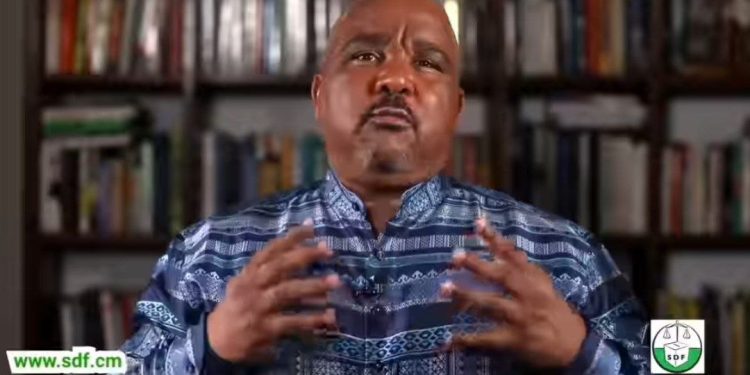Joshua Osih, the National Chairman of the Social Democratic Front (SDF) party, has stated that Cameroon is on the brink of collapse due to the “catastrophic failures” of President Paul Biya’s 41-year rule.
In his end-of-year message on Sunday, December 31, Hon. Osih stated the current regime does not believe in Cameroon and so does not care about the welfare of citizens, plunging the nation into several woes.
He cited the disturbing economic situation of the country, marked by a high cost of living due to inflation, conflict, and humanitarian crises, as well as corruption and bad governance.
The regime, he said, is making matters worse as it has instituted 87 new taxes for Cameroonians this year, while government officials swindle hundreds of billions of francs into private pockets each year.
While ostensibly a message of hope and renewal, a closer examination reveals a deeper narrative—a stark critique of the country’s current state and a plea for Cameroonians to rise for a political change.
Osih’s opening message paints a grim picture.
Armed Conflicts in Different Regions
Among the challenges he mentioned were the armed conflict in the Anglophone regions and the Far North; and the economic hardship gripping ordinary citizens.
This, Osih argues, is the direct consequence of the current government’s failures.
Osih notes that the “crises are nothing less than a testament to the Biya regime’s catastrophic failures, and we all know that you cannot use the same people who caused a problem to resolve it.”
Corruption and Mismanagement
His message accuses the regime of widespread corruption and economic mismanagement.
The Biya administration, Osih contends, has presided over a system that enriches the privileged few while leaving the masses to grapple with insecurity and rising costs.
“The president who rules our country and those who enable him… have shown that they don’t believe in our rights to have a better life. They don’t believe in Cameroon,” he said.
This scathing indictment lays bare the SDF’s view that Cameroon’s current path is unsustainable and there is a need for urgent change.
Charting a new path
But Osih’s message is not merely one of lament. He offers a counterpoint, a roadmap for Cameroon’s future.
The SDF, he proposes, stands for a more equitable and just society, one where the focus is on improving the lives of ordinary citizens.
He has been at the helm of the party since October 29, when he was voted National Chairman to replace the party’s late founding father, Ni John Fru Ndi.
Osih described Fru Ndi as “a beckon of courage, and his legacy will forever inspire us.”
He said the SDF will continue his legacy and outlined the party’s concrete plans for decentralizing development, creating jobs, and bolstering education and healthcare – a stark contrast to the current system of centralized power and neglect.
Some of these, plans, he says, involve the, “allocating of at least 40% of the state budget to local development, and the setting up of at least one industry per division… The SDF has a plan to make long overdue changes so that our economy makes life a little easier for everybody.”
2025 Elections in Cameroon
The fulcrum of Osih’s message, however, is the upcoming 2025 elections. He implores Cameroonians to register to vote and exercise their democratic right.
In his eyes, these elections are not just another political exercise, but a critical turning point – a chance to break free from the shackles of the past and forge a new path.
Osih’s New Year message also serves as a powerful call to action.
It is a message born of both lament for past failures and a vision for the future—a stark critique of the present coupled with a plan for a better future.
Whether his words resonate with the Cameroonian people and translate into political change at the ballot box remains to be seen.
But one thing is certain: Joshua Osih has thrown down the gauntlet, challenging the status quo and urging his fellow citizens to demand a more just and prosperous Cameroon.
While Osih paints a bleak picture of Cameroon under Biya, his own party’s record is not without blemishes.
The mission was geared towards addressing the endemic marginalisation of people of the North West and South West Regions, who joined their “brothers” of the Republic of Cameroun through a Plebiscite.
The feasibility of the SDF’s plans for development and social reform has been considered by many as ambiguous.
To be more realistic, the political leader is expected to provide a clear roadmap for how these promises will be translated into concrete action.
The upcoming elections are undoubtedly crucial, but Osih’s message risks oversimplifying the complex political landscape.
Engaging with the concerns of other parties and constituencies would strengthen his appeal.
Osih’s message is a potent blend of passion and pragmatism. It has ignited a crucial conversation about Cameroon’s future.
Whether his words spark meaningful change remains to be seen, but one thing is certain: Joshua Osih has rekindled the flames of hope and challenged his fellow citizens to demand a better Cameroon.
Evelyn N contributed to this article



